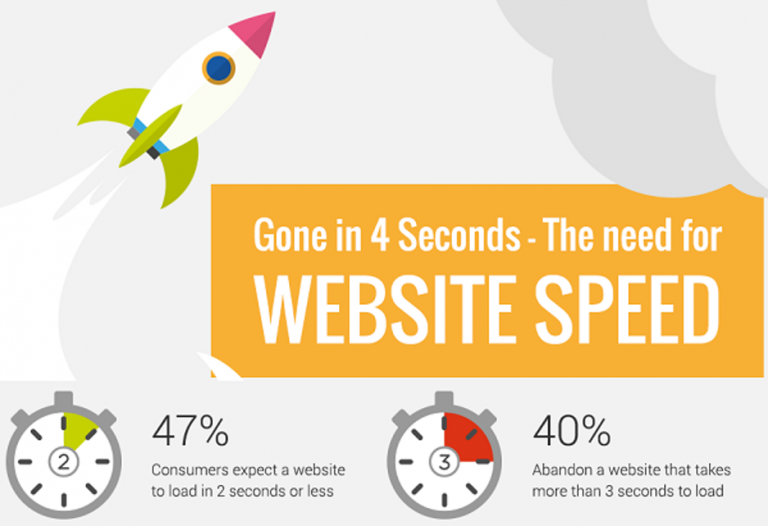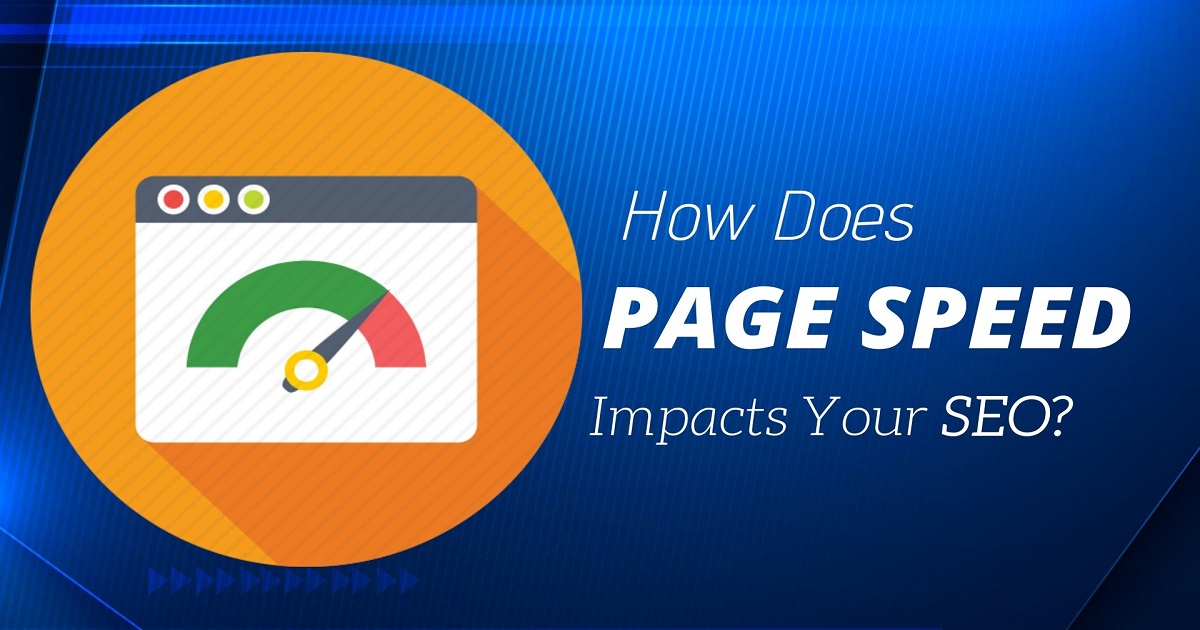We’ve all been there, you’re shopping online or looking for information when you see a site that interests you, and click the link to view it. One second passes, then two, now three, maybe even four! That’s it, you gave up and went back to the search results, you will look elsewhere to find what you are looking for.
It’s a reality of modern life that we expect things almost instantly, and that’s because technology and high-speed broadband have made it possible for us to have almost everything we need at the click of a button. As practical as it is, it did a little damage to our patience.
In fact, according to Neil Patel, 40% of users will abandon a website that takes more than three seconds to load. While another 32.3% said they would wait up to six seconds for a page to load, Google’s own data from Google Analytics suggests that the actual bounce rate caused by slow-loading sites maybe even higher than that.
This is worrying news for many businesses, especially e-commerce ones, as it has also been revealed that nearly 70% of consumers admit that low page speed would affect their willingness to shop at a retailer.

It is clear, then, that the loading speed of the website is important for all companies. Pages that take a long time to load can have a number of detrimental effects on your business. We know this can affect sales and even damage a brand’s reputation, but can it really affect its search engine rankings? Let’s take a closer look to find out exactly how page speed affects your rankings and what you can do to improve your site speed.
What Is Page Speed?
While it may seem obvious, let’s first take a quick look at what page speed really is so we can know what we’re talking about. Page speed is the speed at which each page on your site loads and is measured in seconds (if measured in minutes, you’re really in trouble!). All pages may be different due to various factors.
Additionally, speed can also be affected by other aspects such as your internet connection, server performance, the device you are using, the browser, and the number of applications the user is currently running.
It seems unfair, I know, because some of these things are out of your control. But that is why all website owners should invest time and effort in optimizing their website to make sure it performs at its best and that each page loads as quickly as possible.
After all, we’ve already learned that a little over three seconds can cost a visitor and potentially a sale. In the next section, we’ll take a closer look at what may be slowing down your site so you can fix any issues.
What Can Slow Your Pages Down?
There are several things that can slow down your site. Some of the main contributing factors are described below.
Your host: When setting up your website, you may have taken some shortcuts to save some money, but this can cause problems later. You need to make sure you choose the right host for the size and scope of your business and the content you will be hosting on it. If you expect a lot of traffic, consider VPS or dedicated hosting instead of being on a shared server.
Your Theme: Some themes are highly customized with lots of great features and effects, but it really slows down your website and if you need to constantly add plugins to add different functions to your website it can get really clunky very quickly.
Large Images: If your site hosts a lot of large files and images, this can also slow it down. It is generally better to use PNG instead of JPEG to save space. Try compressing and shrinking your images when you upload them to the website, which will save you precious time uploading them.
Embedded Media: External media, such as videos from other sites, can also slow down your page. To get some of this back, you can host the videos on your own server.
Unoptimized browsers and plugins: Page speed can be affected by non-optimized browsers, plugins, and applications, so it’s a good idea to test your site across all browsers to check your speed and see what you can do. about that.
Widgets: Some widgets, like social media buttons, can slow down your pages. See what you need and what you don’t need, and when in doubt, ask your developers, they can create a feature that doesn’t take up as much space and time.
Too many ads: Too many ads can annoy your visitors, but they can also slow down your site. That is why it is better to be selective with your advertising.
Your code: If your HTML, CSS, and JavaScript are not very efficient or are very dense, this can also affect the speed of the page. Applying Gzip compression to them will save a lot of loading time, check with your developers again for more details on this.
But Does Speed Really Affect Rankings And How?
The simple answer to that question is yes, page speed really does affect your search engine rankings. There are several reasons for this that we will examine in more detail below, but one of the main reasons why your ranking may be affected by page speed is that it is widely accepted that Google’s algorithm considers load time as an important ranking factor.
This was highlighted in early 2010 when Google made public its consideration of page speed as an important issue that webmasters should focus on.
There are other indirect ways that page speed is affecting your SEO, and this is something that experts have been desperately trying to instruct businesses in for several years. This is because website speed affects SEO in a few important ways.
First of all, by improving your site speed and making sure your load time is no longer than a second or two, you are likely to increase your conversion rates.
As stated above, users will leave a site if it takes more than three seconds to load. This can cost your visitors and increase your bounce rate. Your bounce rate is something that search engines take into account when ranking your site.
This is because if a large number of people leave your site almost immediately, it is evident that it is not loading correctly or does not offer the value they were looking for, something that search engine algorithms take very seriously (that’s basically their main function after all).
So simply put, the higher your engagement and the lower your bounce rate, the higher your ranking on search engines like Google.
Not only that, but increasing the loading speed of your website will improve the user experience. This, in turn, can help increase the time you spend on your pages. In the introduction, we talked about how slow page speeds can affect the user experience and put potential customers off, with an impressive 70% saying that slow pages would prevent them from making a purchase.
Therefore, it is crucial that your website is user-friendly and offers the best possible experience, and loading time plays a big role in this. The more time people spend on your site and the better their experience with it, the higher it’s ranking in search engines.
Mobile Vs Desktop And How This Affects Your Rankings
Another aspect that can affect your ranking is the loading time of your pages on different devices. With so many people now using their smartphone or tablet as their primary device, mobile devices have become a growing area of interest for many businesses.
So much so that 30% of mobile device users will abandon purchases on a website that is not optimized for mobile devices, and that percentage is likely to increase in the future.
Since many user searches are now coming from mobile devices, search engines have had to adapt to accommodate this. The increasing popularity of mobile searches means that it would be foolish for search engines to not take this into account when ranking sites.

After all, some people may never see the desktop version of your website, using only their mobile devices. So another thing you need to consider is whether you have optimized your mobile site and how long it takes for your pages to load on these devices.
If you find that they are slower due to things like network and 3G, you may need to continue working on your pages to ensure that they are optimized for mobile devices and do not experience slow load times through these increasingly popular devices.
In short, your web pages can look great on a desktop and you may think you did everything you can to increase page speed, but if it doesn’t load quickly on a mobile device, search engines will penalize you and you won’t have a ranking as high as you would like.
What Other Tools Can I Use To Improve My Load Time?
PageSpeed Insights is not the only tool on the web that can help you evaluate the performance and load time of your website. There are a few different tools you can choose from to help you improve your page speed and work on other areas of your website that can increase your load time and SEO. They are described in more detail below:
Webpage Test: This is another Google tool that offers a free quick speed test and provides charts on how to optimize your page speed.
YUI Compressor: This tool allows you to compress your website code, minimizing JavaScript and CSS to increase loading time.
YSlow: This is a plugin that gives you insight into your website performance and how to improve your website speed.
OnCrawl: Finally, this tool is another one that offers an overview of your website’s page speed and performance. It also shows you which pages you need to optimize for maximum results.
Summary
The loading speed of each page on your website is very important to the success of any online business. It is inextricably linked to conversion rates, trust, and user loyalty, and therefore not something you want to ignore. In this guide, we’ve covered a number of things that can slow down your pages so you can take steps to combat them.
We’ve also seen how page speed can affect your rankings, and what tools you can use to improve your load time and solve technical SEO issues. Lastly, we’ve put together some important tips to keep in mind when building and optimizing websites for the best results.
Page speed is measured in seconds and is the time it takes to load each of your web pages. This can vary from page to page.
Your theme, encoding, browser, host, plugins, and ads can affect the speed of your pages. Make sure to think carefully about your options and test your site in different browsers.
The speed of the page affects its positioning in search engines like Google, thanks to perception tools and algorithms
Your ranking can also be indirectly affected by things like bounce rate and length of stay.
The device is also important for SEO with Google, considering both mobile and desktop devices when ranking your site. As such, you need to ensure that your web pages are optimized for both.
There are several tools you can use to help increase page speed, including PageSpeed Insight, YSlow, OnCrawl, and web page testing.
